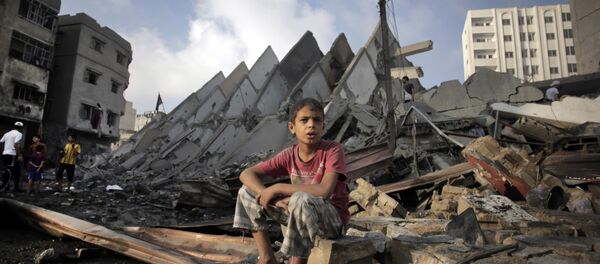In a new research paper, Sami Abdel-Shafi, senior fellow for the Middle East and North Africa program at UK think tank Chatham House, says changes need to be made to the EU's current approach of trying to boost Palestinian economic development, which he says is being stalled by the "dysfunctional peace process" with Israel.
Congratulations to Academy Associate Sami Abdel Shafi for launching his report on EU policy on #Palestine #CHEvents pic.twitter.com/5sC7ZRXg1S
— QE II Academy (@QEII_Academy) October 28, 2015
Abdel-Shafi says that the EU needs to find ways to "decouple" Palestinian economic development from the peace process.
"If Palestinians achieve a sovereign state, they will need a viable economy to support it. Conversely, if this fundamental political goal is delayed for the longer term, Palestinians are still entitled to dignified lives until they realize it," he said.
"Economic development is not a substitute for political rights. As an educated and entrepreneurial people, Palestinians are capable of creating a viable economy that would support a sovereign state unreliant on foreign aid."
'Crippled Palestinian Economy Doesn't Make Israel Safer'
Although Palestine has received more than US$6.6 billion worth of EU aid since 1994, Abdel-Shafi notes that "the majority of EU funding has been dedicated to supporting the Palestinian Authority (PA) through an unsustainable economic situation and to supporting the humanitarian needs of Palestinians instead of their development."
Realigning EU Policy in Palestine: Towards a Viable State Economy and Restored Dignity — paper by Sami Abdel Shafi https://t.co/z5nZaWJYTx
— Chatham House MENA (@CH_MENAP) October 28, 2015
Abdel-Shafi believes that the EU should make greater efforts to help the Palestinian Authority achieve "economic self-reliance" through measures such as revitalizing the private sector and changing framework to boost economic development.
Perhaps, most importantly, it is thought that shifting EU policy on Palestinian economic development could in fact boost the security and safety concerns of both Palestinians and Israelis, given that a plan to boost economic development would force both sides to adhere to international standards.
"This includes addressing Israel's occupation and its 'layering' of measures under the name of security that undermine Palestinian economic development. A crippled Palestinian economy does not make Israel safer, but it meanwhile diminishes Palestinian dignity and hope for the future."



